Featured Articles
The World Boxing Council Has Reanimated the Debate over Open Scoring
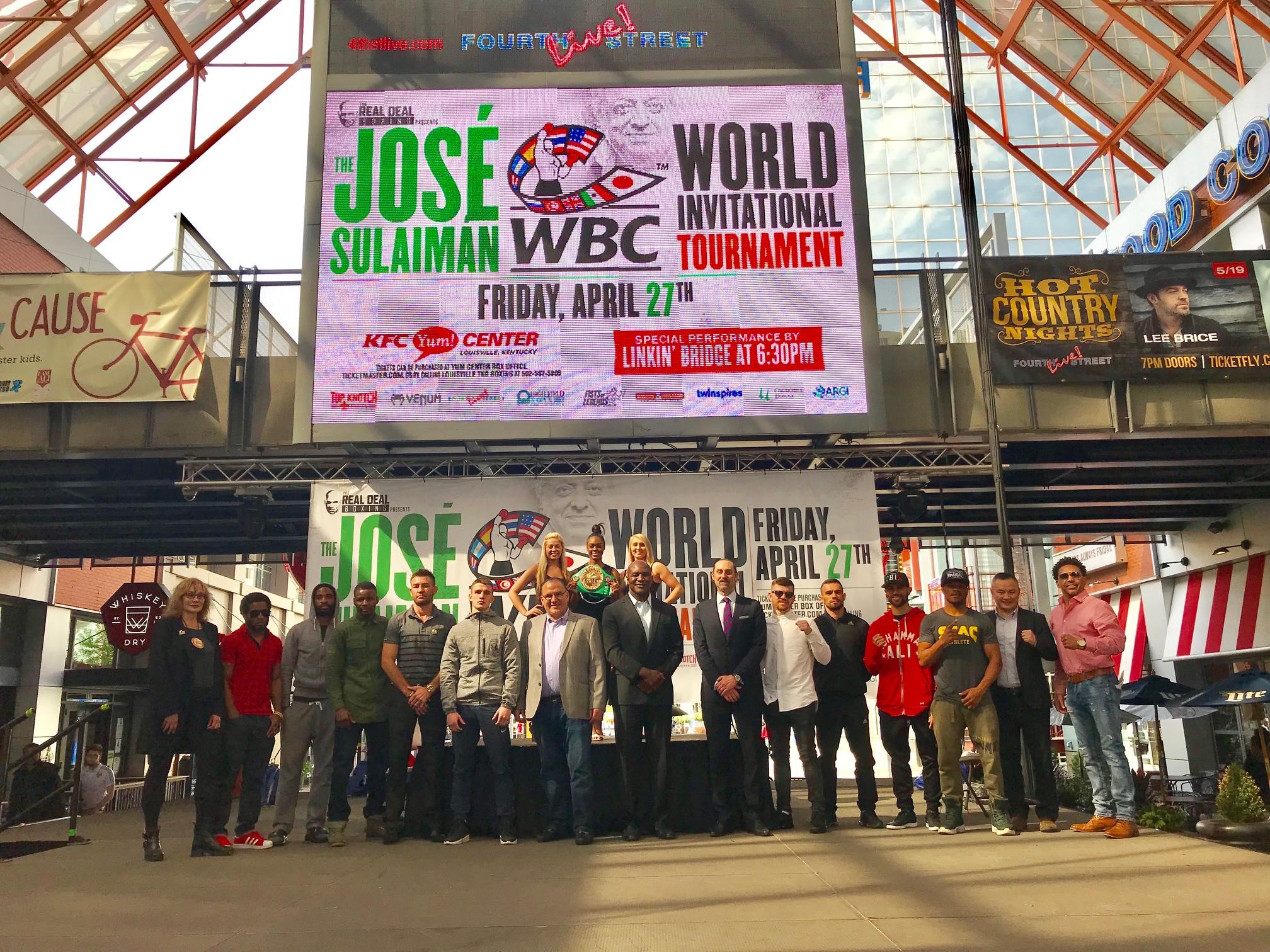
Later this month, on August 25, the semifinals of the WBC welterweight tournament will be held in Toronto. South Africa’s Chris Van Heerden (26-2-1) meets Ghana’s Fredrick Lawson (27-1) in one of the co-featured bouts. Mexico’s Francisco Santana (25-6-1) opposes Brad Solomon (28-1) of Douglasville, Georgia, in the other.
The WBC tourney, staged in conjunction with Evander Holyfield’s Real Deal Promotions, kicked off on April 27 in Louisville. Eight invitees participated in a poor man’s version of the World Boxing Super Series.
The promotion had several unconventional coils built into the scaffolding. There were five judges instead of three. Four of the judges sat ringside. The other was positioned in front of a TV monitor with the sound off. Their scorecards were revealed at the midpoint of the bout (between rounds five and six) so that the fighters and their handlers and those in the arena and those watching on television were apprised of who was leading and to what degree. However, the names of the judges were kept anonymous.
These twists appeared to go off without a hitch. Indeed, there was virtually no commentary, pro or con, on social media.
The argument for open scoring in boxing is as old as the hills. In what other sport are the competitors and fans kept in the dark until the competition is finished?
The clamor for it was especially loud after the March 13, 1999 fight between Lennox Lewis and Evander Holyfield.
All of the meaningful belts were at stake when Lewis and Holyfield squared off at Madison Square Garden in the first heavyweight title unification fight in six years. When the final bell sounded, most everyone thought it was a foregone conclusion that the decision would go to Lewis. The verdict, a split draw, elicited howls of protest and sparked six investigations, most aimed at IBF-appointed judge Eugenia Williams, a 48-year-old Newark municipal clerk. She had it 115-113 for Holyfield, even giving Evander the fifth round, which many thought was Lewis’s best round of the fight.
The sport’s top promoters, Don King and Bob Arum, joined the chorus for open scoring. Six weeks after the Lewis-Holyfield fiasco, Don King promoted a show in Washington, DC, that featured three local fighters — Keith Holmes, Mark Johnson, and Sharmba Mitchell – in world title fights. Holmes challenged Hacime Cherifi for the WBC middleweight title. Johnson met Ratanachai Sor Vorapin (aka Chaiya Pothang) for the vacant IBF super flyweight strap, and Mitchell defended his WBA 140-pound title against Reggie Green.
The scores were announced after every round of the Mitchell-Green fight and after the fourth, eighth, and final rounds of the other two. (That Don King was able to get all three sanctioning bodies plus the D.C. commission on board with his requisition for open scoring spoke reams about his sway over the sport.)
Keith Holmes rendered the open scoring experiment moot when he stopped his opponent in the seventh round. The other bouts went the distance. Johnson was quick to establish his superiority over Vorapin and won lopsidedly. Mitchell won a majority decision over Green, but the fight wasn’t really that close. After 10 rounds, Mitchell was comfortably ahead on two of the scorecards and coasted home.
This was a test case and when it was evaluated the verdict wasn’t favorable. Updating the scorecards and getting the results posted in the one-minute interval between rounds was challenging. Proponents of open scoring thought it would generate more excitement as fighters trailing on the scorecards pulled out all the stops in a last-ditch effort to snatch victory from the jaws of defeat, but it was just as likely to elicit boredom as fighters went into a shell to protect a comfortable lead as happened in the Mitchell-Green fight. The IBF supervisor in attendance noted that open scoring seemed to encourage fans to leave early, depressing sales at the concession stands.
All three organizations decided to abandon the experiment, but that didn’t stop Bob Arum from beseeching the Nevada commission to implement open scoring for his forthcoming fight on May 8, 1999, between Erik Morales and Juan Carlos Ramirez. Arum stood before the commission and exhausted an hour arguing his case. Open scoring, he said, would lift boxing out of the medieval age. But the commission wasn’t buying it. Notoriously churlish when things don’t go his way, a disgruntled Arum said, “If these guys (the commissioners) were the Pope, Catholics would still be eating fish on Friday.”
Arum had no chance because the commissioners knew that NSAC executive secretary Marc Ratner, the de facto head of the commission, was opposed. “One of my favorite moments in sports,” said Ratner, “is when the announcer gets up and says ‘and still champion’ or ‘and new champion.’” Lou DiBella, who then held the post of senior vice president for HBO Sports, didn’t like it either. Open scoring, he said, “doesn’t stop a crime from being committed; it just lets people see it while it is happening.”
Open scoring was revived for the 2013 fight at the San Antonio Alamodome between WBC 154-pound champion Canelo Alvarez and his WBA counterpart, Austin Trout. The scores were announced after the fourth and eighth rounds. South African judge Stanley Christodoulou, one of the sport’s most experienced arbiters, had an off night. Those tuning in to the Showtime telecast thought his scorecard was an outrage.
Showtime commentator Al Bernstein scored the fight a draw. His colleagues Steve Farhood and Paulie Malignaggi had Alvarez winning by a slim margin. All three official judges had Alvarez winning too, but Christodoulou’s card (118-109) invited censure for being far too extreme. He had Canelo winning each of the first eight rounds, after which the Mexican superstar took his foot off the pedal. And because Austin Trout lacked a knockout punch, divulging the scores after round eight ought to have been prefaced with a spoiler alert.
“We were robbed of the possibility of seeing any late-round magic,” wrote Brian Mazique in Bleacher Report. “The right man won and that is what is most important. I just wish I hadn’t found out after the eighth round.” But despite this denouement, the would-be antiseptic of open scoring just wouldn’t go away.
I’m no fan of the WBC which seemingly wants to suck a sanctioning fee out of every fight, no matter how small, and I would be opposed to the universal application of five judges as I know what a financial hardship it would work on shoestring promoters, the lifeblood of the sport. However, it strikes me that the WBC may have gotten it right this time, striking the perfect balance by giving away the scores of the judges only once during the course of a fight and not too deep into it – just a midterm report, so to speak.
What’s your take?
Check out more boxing news on video at The Boxing Channel
Featured Articles
Arne’s Almanac: The First BWAA Dinner Was Quite the Shindig
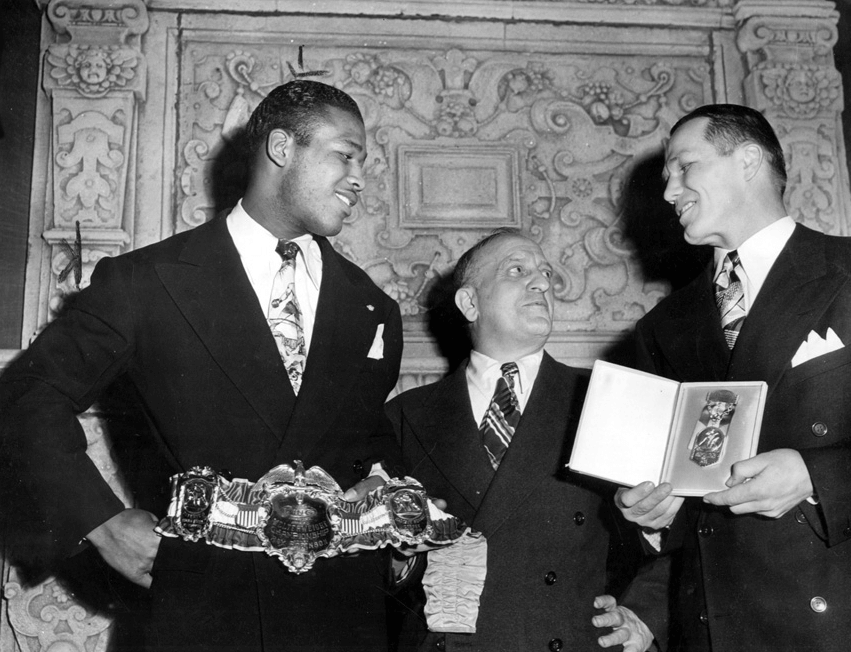
The first annual dinner of the Boxing Writers Association of America was staged on April 25, 1926 in the grand ballroom of New York’s Hotel Astor, an edifice that rivaled the original Waldorf Astoria as the swankiest hotel in the city. Back then, the organization was known as the Boxing Writers Association of Greater New York.
The ballroom was configured to hold 1200 for the banquet which was reportedly oversubscribed. Among those listed as agreeing to attend were the governors of six states (New York, New Jersey, Massachusetts, Pennsylvania, Connecticut, and Maryland) and the mayors of 10 of America’s largest cities.
In 1926, radio was in its infancy and the digital age was decades away (and inconceivable). So, every journalist who regularly covered boxing was a newspaper and/or magazine writer, editor, or cartoonist. And at this juncture in American history, there were plenty of outlets for someone who wanted to pursue a career as a sportswriter and had the requisite skills to get hired.
The following papers were represented at the inaugural boxing writers’ dinner:
New York Times
New York News
New York World
New York Sun
New York Journal
New York Post
New York Mirror
New York Telegram
New York Graphic
New York Herald Tribune
Brooklyn Eagle
Brooklyn Times
Brooklyn Standard Union
Brooklyn Citizen
Bronx Home News
This isn’t a complete list because a few of these papers, notably the New York World and the New York Journal, had strong afternoon editions that functioned as independent papers. Plus, scribes from both big national wire services (Associated Press and UPI) attended the banquet and there were undoubtedly a smattering of scribes from papers in New Jersey and Connecticut.
Back then, the event’s organizer Nat Fleischer, sports editor of the New York Telegram and the driving force behind The Ring magazine, had little choice but to limit the journalistic component of the gathering to writers in the New York metropolitan area. There wasn’t a ballroom big enough to accommodate a good-sized response if he had extended the welcome to every boxing writer in North America.
The keynote speaker at the inaugural dinner was New York’s charismatic Jazz Age mayor James J. “Jimmy” Walker, architect of the transformative Walker Law of 1920 which ushered in a new era of boxing in the Empire State with a template that would guide reformers in many other jurisdictions.
Prizefighting was then associated with hooligans. In his speech, Mayor Walker promised to rid the sport of their ilk. “Boxing, as you know, is closest to my heart,” said hizzoner. “So I tell you the police force is behind you against those who would besmirch or injure boxing. Rowdyism doesn’t belong in this town or in your game.” (In 1945, Walker would be the recipient of the Edward J. Neil Memorial Award given for meritorious service to the sport. The oldest of the BWAA awards, the previous recipients were all active or former boxers. The award, no longer issued under that title, was named for an Associated Press sportswriter and war correspondent who died from shrapnel wounds covering the Spanish Civil War.)
Another speaker was well-traveled sportswriter Wilbur Wood, then affiliated with the Brooklyn Citizen. He told the assembly that the aim of the organization was two-fold: to help defend the game against its detractors and to promote harmony among the various factions.
Of course, the 1926 dinner wouldn’t have been as well-attended without the entertainment. According to press dispatches, Broadway stars and performers from some of the city’s top nightclubs would be there to regale the attendees. Among the names bandied about were vaudeville superstars Sophie Tucker and Jimmy Durante, the latter of whom would appear with his trio, Durante, (Lou) Clayton, and (Eddie) Jackson.
There was a contraction of New York newspapers during the Great Depression. Although empirical evidence is lacking, the inaugural boxing writers dinner was likely the largest of its kind. Fifteen years later, in 1941, the event drew “more than 200” according to a news report. There was no mention of entertainment.
In 1950, for the first time, the annual dinner was opened to the public. For $25, a civilian could get a meal and mingle with some of his favorite fighters. Sugar Ray Robinson was the Edward J. Neil Award winner that year, honored for his ring exploits and for donating his purse from the Charlie Fusari fight to the Damon Runyon Cancer Fund.
There was no formal announcement when the Boxing Writers Association of Greater New York was re-christened the Boxing Writers Association of America, but by the late 1940s reporters were referencing the annual event as simply the boxing writers dinner. By then, it had become traditional to hold the annual affair in January, a practice discontinued after 1971.
The winnowing of New York’s newspaper herd plus competing banquets in other parts of the country forced Nat Fleischer’s baby to adapt. And more adaptations will be necessary in the immediate future as the future of the BWAA, as it currently exists, is threatened by new technologies. If the forthcoming BWAA dinner (April 30 at the Edison Ballroom in mid-Manhattan) were restricted to wordsmiths from the traditional print media, the gathering would be too small to cover the nut and the congregants would be drawn disproportionately from the geriatric class.
Some of those adaptations have already started. Last year, Las Vegas resident Sean Zittel, a recent UNLV graduate, had the distinction of becoming the first videographer welcomed into the BWAA. With more and more people getting their news from sound bites, rather than the written word, the videographer serves an important function.
The reporters who conducted interviews with pen and paper have gone the way of the dodo bird and that isn’t necessarily a bad thing. A taped interview for a “talkie” has more integrity than a story culled from a paper and pen interview because it is unfiltered. Many years ago, some reporters, after interviewing the great Joe Louis, put words in his mouth that made him seem like a dullard, words consistent with the Sambo stereotype. In other instances, the language of some athletes was reconstructed to the point where the reader would think the athlete had a second job as an English professor.
The content created by videographers is free from that bias. More of them will inevitably join the BWAA and similar organizations in the future.
Photo: Nat Fleischer is flanked by Sugar Ray Robinson and Tony Zale at the 1947 boxing writers dinner.
Featured Articles
Gabriela Fundora KOs Marilyn Badillo and Perez Upsets Conwell in Oceanside
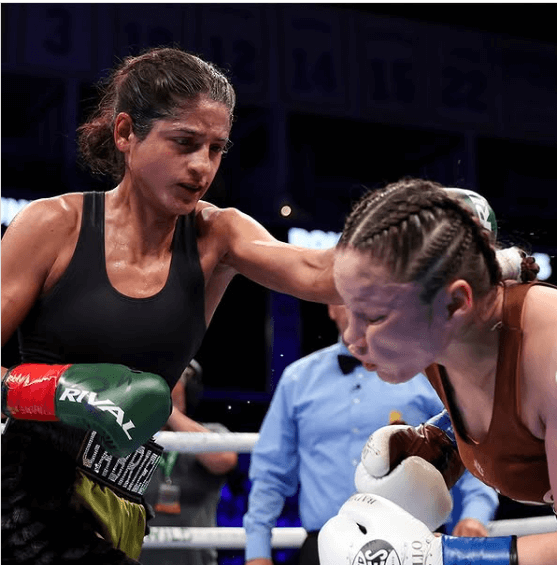
It was just a numbers game for Gabriela Fundora and despite Mexico’s Marilyn Badillo’s elusive tactics it took the champion one punch to end the fight and retain her undisputed flyweight world title by knockout on Saturday.
Will it be her last flyweight defense?
Though Fundora (16-0, 8 KOs) fired dozens of misses, a single punch found Badillo (19-1-1, 3 KOs) and ended her undefeated career and first attempt at a world title at the Frontwave Arena in Oceanside, California.
Fundora, however, proves unbeatable at flyweight.
The champion entered the arena as the headliner for the Golden Boy Promotion show and stepped through the ropes with every physical advantage possible, including power.
Mexico’s Badillo was a midget compared to Fundora but proved to be as elusive as a butterfly in a menagerie for the first six rounds. As the six-inch taller Fundora connected on one punch for every dozen thrown, that single punch was a deadly reminder.
Badillo tried ducking low and slipping to the left while countering with slashing uppercuts, she found little success. She did find the body a solid target but the blows proved to be useless. And when Badillo clinched, that proved more erroneous as Fundora belted her rapidly during the tie-ups.
“She was kind of doing her ducking thing,” said Fundora describing Badillo’s defensive tactics. “I just put the pressure on. It was just like a train. We didn’t give her that break.”
The Mexican fighter tried valiantly with various maneuvers. None proved even slightly successful. Fundora remained poised and under control as she stalked the challenger.
In the seventh round Badillo seemed to take a stand and try to slug it out with Fundora. She quickly was lit up by rapid left crosses and down she went at 1:44 of the seventh round. The Mexican fighter’s corner wisely waved off the fight and referee Rudy Barragan stopped the fight and held the dazed Badillo upright.
Once again Fundora remained champion by knockout. The only question now is will she move up to super flyweight or bantamweight to challenge the bigger girls.
Perez Beats Conwell.
Mexico’s Jorge “Chino” Perez (33-4, 26 KOs) upset Charles Conwell (21-1, 15 KOs) to win by split decision after 12 rounds in their super welterweight showdown.
It was a match that paired two hard-hitting fighters whose ledgers brimmed with knockouts, but neither was able to score a knockdown against each other.
Neither fighter moved backward. It was full steam ahead with Conwell proving successful to the body and head with left hooks and Perez connecting with rights to the head and body. It was difficult to differentiate the winner.
Though Conwell seemed to be the superior defensive fighter and more accurate, two judges preferred Perez’s busier style. They gave the fight to Perez by 115-113 scores with the dissenter favoring Conwell by the same margin.
It was Conwell’s first pro loss. Maybe it will open doors for more opportunities.
Other Bouts
Tristan Kalkreuth (15-1) managed to pass a serious heat check by unanimous decision against former contender Felix Valera (24-8) after a 10-round back-and-forth heavyweight fight.
It was very close.
Kalkreuth is one of those fighters that possess all the physical tools including youth and size but never seems to be able to show it. Once again he edged past another foe but at least this time he faced an experienced fighter in Valera.
Valera had his moments especially in the middle of the 10-round fight but slowed down during the last three rounds.
One major asset for Kalkreuth was his chin. He got caught but still motored past the clever Valera. After 10 rounds two judges saw it 99-91 and one other judge 97-93 all for Kalkreuth.
Highly-rated prospect Ruslan Abdullaev (2-0) blasted past dangerous Jino Rodrigo (13- 5-2) in an eight round super lightweight fight. He nearly stopped the very tough Rodrigo in the last two rounds and won by unanimous decision.
Abdullaev is trained by Joel and Antonio Diaz in Indio.
Bakersfield prospect Joel Iriarte (7-0, 7 KOs) needed only 1:44 to knock out Puerto Rico’s Marcos Jimenez (25-12) in a welterweight bout.
To comment on this story in the Fight Forum CLICK HERE
Featured Articles
‘Krusher’ Kovalev Exits on a Winning Note: TKOs Artur Mann in his ‘Farewell Fight’
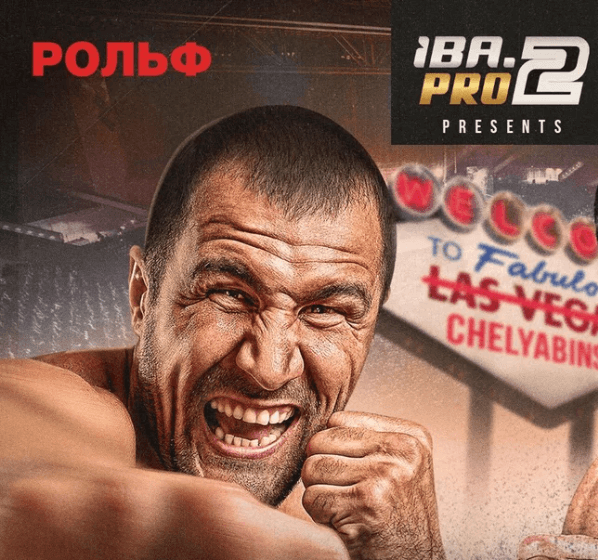
At his peak, former three-time world light heavyweight champion Sergey “Krusher” Kovalev ranked high on everyone’s pound-for-pound list. Now 42 years old – he turned 42 earlier this month – Kovalev has been largely inactive in recent years, but last night he returned to the ring in his hometown of Chelyabinsk, Russia, and rose to the occasion in what was billed as his farewell fight, stopping Artur Mann in the seventh frame.
Kovalev hit his peak during his first run as a world title-holder. He was 30-0-1 (26 KOs) entering first match with Andre Ward, a mark that included a 9-0 mark in world title fights. The only blemish on his record was a draw that could have been ruled a no-contest (journeyman Grover Young was unfit to continue after Kovalev knocked down in the second round what with was deemed an illegal rabbit punch). Among those nine wins were two stoppages of dangerous Haitian-Canadian campaigner Jean Pascal and a 12-round shutout over Bernard Hopkins.
Kovalev’s stature was not diminished by his loss to the undefeated Ward. All three judges had it 114-113, but the general feeling among the ringside press was that Sergey nicked it.
The rematch was also somewhat controversial. Referee Tony Weeks, who halted the match in the eighth stanza with Kovalev sitting on the lower strand of ropes, was accused of letting Ward get away with a series of low blows, including the first punch of a three-punch series of body shots that culminated in the stoppage. Sergey was wobbled by a punch to the head earlier in the round and was showing signs of fatigue, but he was still in the fight. Respected judge Steve Weisfeld had him up by three points through the completed rounds.
Sergey Kovalev was never the same after his second loss to Andre Ward, albeit he recaptured a piece of the 175-pound title twice, demolishing Vyacheslav Shabranskyy for the vacant WBO belt after Ward announced his retirement and then avenging a loss to Eleider Alvarez (TKO by 7) with a comprehensive win on points in their rematch.
Kovalev’s days as a title-holder ended on Nov. 2, 2019 when Canelo Alvarez, moving up two weight classes to pursue a title in a fourth weight division, stopped him in the 11th round, terminating what had been a relatively even fight with a hellacious left-right combination that left Krusher so discombobulated that a count was superfluous.
That fight went head-to-head with a UFC fight in New York City. DAZN, to their everlasting discredit, opted to delay the start of Canelo-Kovalev until the main event of the UFC fight was finished. The delay lasted more than an hour and Kovalev would say that he lost his psychological edge during the wait.
Kovalev had two fights in the cruiserweight class between his setback to Canelo and last night’s presumptive swan song. He outpointed Tervel Pulev in Los Angeles and lost a 10-round decision to unheralded Robin Sirwan Safar in Riyadh, Saudi Arabia.
Artur Mann, a former world title challenger – he was stopped in three rounds by Mairis Briedis in 2021 when Briedis was recognized as the top cruiserweight in the world – was unexceptional, but the 34-year-old German, born in Kazakhstan, wasn’t chopped liver either, and Kovalev’s stoppage of him will redound well to the Russian when he becomes eligible for the Boxing Hall of Fame.
Krusher almost ended the fight in the second round. He knocked Mann down hard with a short left hand and seemingly scored another knockdown before the round was over (but it was ruled a slip). Mann barely survived the round.
In the next round, a punch left Mann with a bad cut on his right eyelid, but the German came to fight and rounds three, four and five were competitive.
Kovalev had a good sixth round although there were indications that he was tiring. But in the seventh he got a second wind and unleashed a right-left combination that rolled back the clock to the days when he was one of the sport’s most feared punchers. Mann went down hard and as he staggered to his feet, his corner signaled that the fight should be stopped and the referee complied. The official time was 0:49 of round seven. It was the 30th KO for Kovalev who advanced his record to 36-5-1.
Addendum: History informs us that Farewell Fights have a habit of becoming redundant, by which we mean that boxers often get the itch to fight again after calling it quits. Have we seen the last of Sergey “Krusher” Kovalev? We woudn’t bet on it.
The complete Kovalev-Mann fight card was live-streamed on the Boxing News youtube channel.
To comment on this story in the Fight Forum CLICK HERE
-
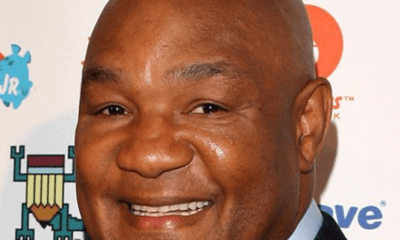
 Featured Articles4 weeks ago
Featured Articles4 weeks agoBernard Fernandez Reflects on His Special Bond with George Foreman
-
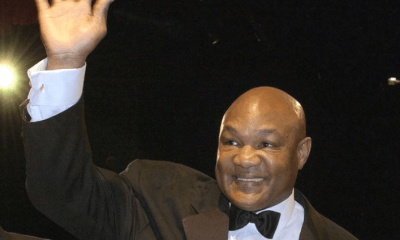
 Featured Articles4 weeks ago
Featured Articles4 weeks agoA Paean to George Foreman (1949-2025), Architect of an Amazing Second Act
-
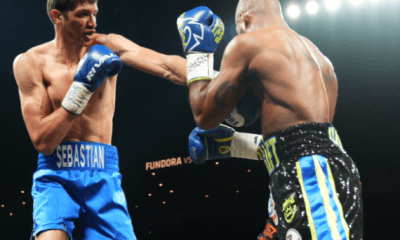
 Featured Articles4 weeks ago
Featured Articles4 weeks agoSebastian Fundora TKOs Chordale Booker in Las Vegas
-
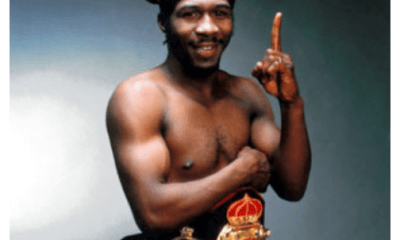
 Featured Articles4 weeks ago
Featured Articles4 weeks agoBoxing Odds and Ends: The Wacky and Sad World of Livingstone Bramble and More
-
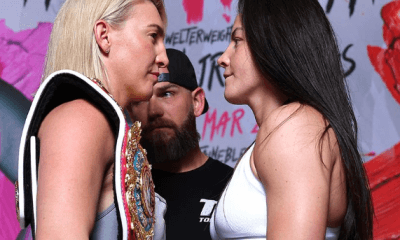
 Featured Articles3 weeks ago
Featured Articles3 weeks agoAvila Perspective, Chap. 319: Rematches in Las Vegas, Cancun and More
-
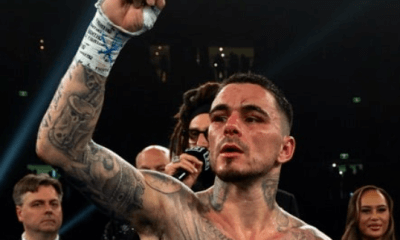
 Featured Articles4 weeks ago
Featured Articles4 weeks agoResults and Recaps from Sydney where George Kambosos Upended Late Sub Jake Wyllie
-

 Featured Articles3 weeks ago
Featured Articles3 weeks agoRingside at the Fontainebleau where Mikaela Mayer Won her Rematch with Sandy Ryan
-
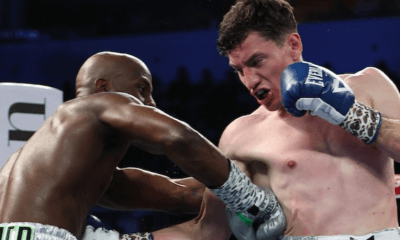
 Featured Articles3 weeks ago
Featured Articles3 weeks agoWilliam Zepeda Edges Past Tevin Farmer in Cancun; Improves to 34-0

















